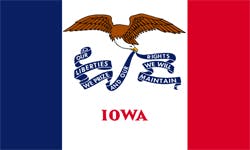Private insurance companies provide Medicare Part C plans (more commonly known as Medicare Advantage). Thanks to increased benefits and plan options, the program becomes more popular every year. Nearly 31 million people had an Advantage plan in 2023, accounting for more than one-half of all Medicare beneficiaries. This page explains Medicare Advantage plans in Iowa.
What is Medicare Advantage in Iowa?
At a minimum, Medicare Advantage plans in Iowa must provide the same coverage you have with Original Medicare. This includes Medicare Part A, hospital insurance, and Medicare Part B, medical insurance.
Prescription drug coverage is provided by Medicare Part D; it is not included with Original Medicare.
Medicare Advantage plans with prescription drug coverage in Iowa
Medicare Advantage Prescription Drug plans (MA-PD) combine your Medicare Parts A, B, and D benefits into a single policy.
Many Advantage plans also offer additional coverage. Popular add-on benefits include:
- Fitness programs
- Hearing aids
- Routine dental care
- Routine vision care
As private insurance companies provide Medicare Advantage plans, coverage varies according to the plan you choose.
Who is eligible for Medicare Advantage in Iowa?
If you have Medicare Parts A and B, you're eligible for Medicare Advantage in Iowa.
If you are an American citizen or permanent legal resident aged 65 or older, you are eligible for Medicare. If you began collecting Social Security benefits at least 4 months before turning 65, you will be automatically enrolled in Parts A and B. If not, you must apply for Medicare through the Social Security website.
You may qualify for Medicare before turning 65 if you collect either Railroad Retirement Board (RRB) or Social Security disability benefits for 24 months. Enrollment is automatic in month 25 of collecting disability.
When can you sign up for a Medicare Advantage plan in Iowa?
You may only sign up for a Medicare Advantage plan in Iowa during specific enrollment periods.
Your first opportunity is your Initial Enrollment Period (IEP), which lasts for 7 months, beginning 3 months before you qualify for Medicare. So, if your 65th birthday or 25th month of collecting disability is in March, your IEP starts on December 1 and ends on June 30.
The General Enrollment Period is for anyone who did not sign up for Part A and/or Part B during their Initial Enrollment Period. It lasts from January 1 until March 31. After General Enrollment ends, you have from April 1 until June 30 to join a Medicare Advantage plan.
Medicare's Annual Enrollment Period (AEP) runs between October 15 and December 7. During this 8-week period, current beneficiaries may make any desired changes to their Medicare coverage, including joining an MA plan.
If you are currently enrolled in Medicare Part C, you may participate in the Medicare Advantage Open Enrollment Period. It lasts from January 1 through March 31 and allows current MA enrollees to either switch to a new MA plan or return to Original Medicare. You can also sign up for a standalone Part D plan if that change causes you to lose your prescription drug coverage.
Special Enrollment Periods are available to people who experience certain life changes. Find the full list of qualifying special circumstances on Medicare.gov.
Types of Medicare Advantages plans in Iowa
The four main types of Medicare Advantage plans in Iowa are:
- Health maintenance organizations: HMO plans employ a variety of measures to help control costs. The first of these is the provider network, which may include any entity that supplies healthcare services (doctors, labs, hospitals, durable medical equipment, etc.). Care received from an out-of-network provider is generally not covered except in cases of emergency. HMOs also require members to choose a primary care doctor and get a referral before seeing a specialist.
- Preferred provider organizations: PPO plans also have provider networks, but they allow members to see an out-of-network provider for a higher cost. You also don't need to choose a primary doctor or get a referral to see a specialist with a PPO plan.
- Private fee-for service: PFFS plans determine how much they – and members – will pay for covered services. Most PFFS plans have a provider network but allow members to use an out-of-network provider for a higher cost. However, unless it's an emergency, out-of-network providers may refuse to treat you.
- Special needs plans (SNPs) limit membership to people who meet specific criteria. Guidelines vary according to the plan, but generally amount to having a chronic condition, living in an institution, or qualifying for both Medicare and Medicaid. You usually have to choose a primary doctor with a special needs plan. Most SNPs also require referrals to see a specialist.
How to choose a Medicare Advantage plan in Iowa
When comparing plan options, consider the following metrics:
- Costs: These may include an annual deductible, monthly premiums, and copays or coinsurance. Please note that joining an Advantage plan does not exempt you from the Medicare Part B premium.
- Coverage: Compare your options carefully and don't forget the drug formulary if it's MA-PD plan. This is the list of prescription medications covered by the plan.
- Network: If you have complex or preexisting health conditions, you may want to make sure the plan's network includes your providers.
- Ratings: Medicare rates plans on a 5-point scale, publishing their findings every autumn to help members compare their options during Annual Enrollment.
Our Find a Plan tool makes it easy to compare Medicare Advantage plans in Iowa. Just enter your location information and estimated coverage start date to review the Medicare plan options in your area.
